Sir John Monash, Personal Files Book 15, 10 May - 9 June 1917, Part 13
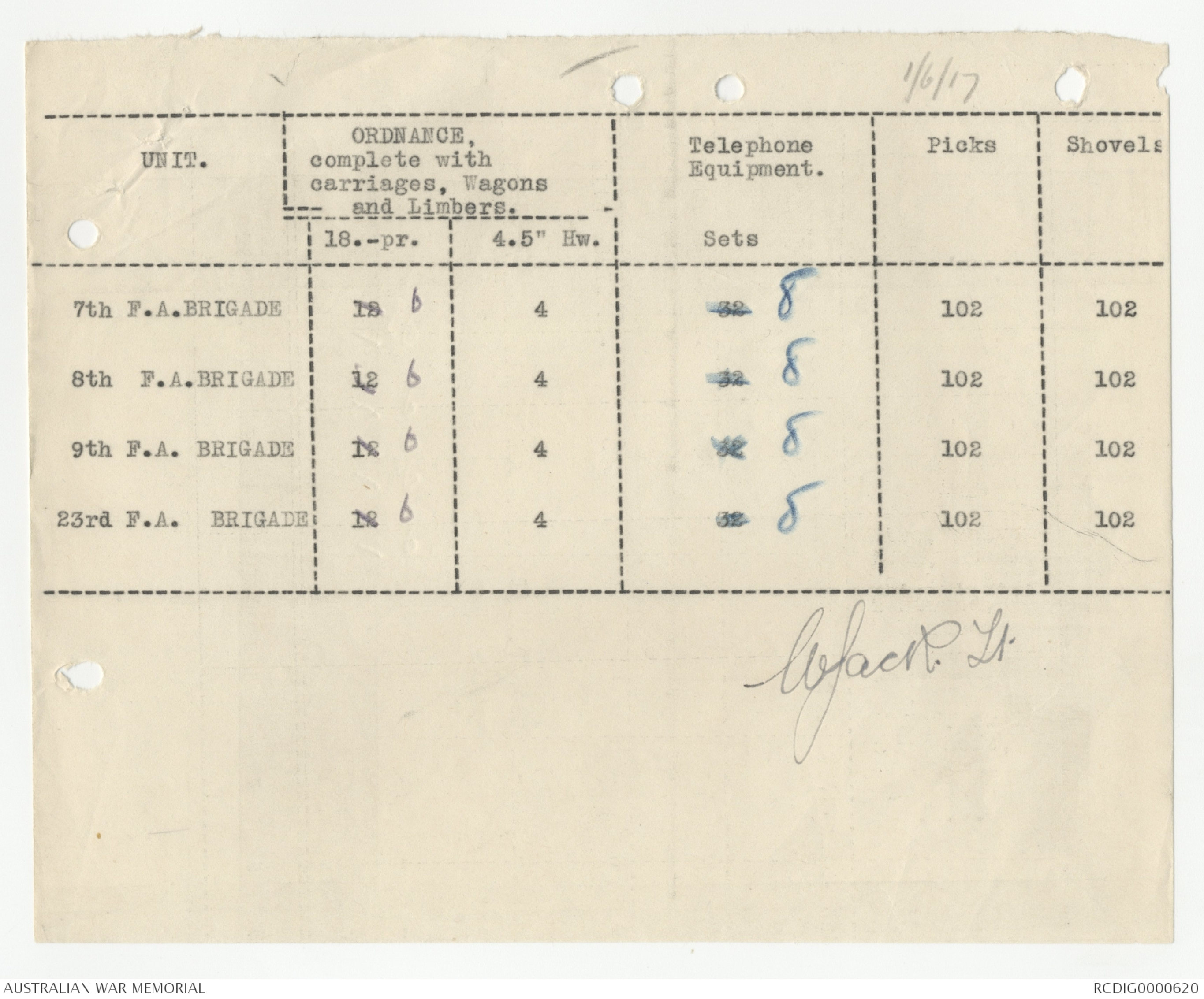
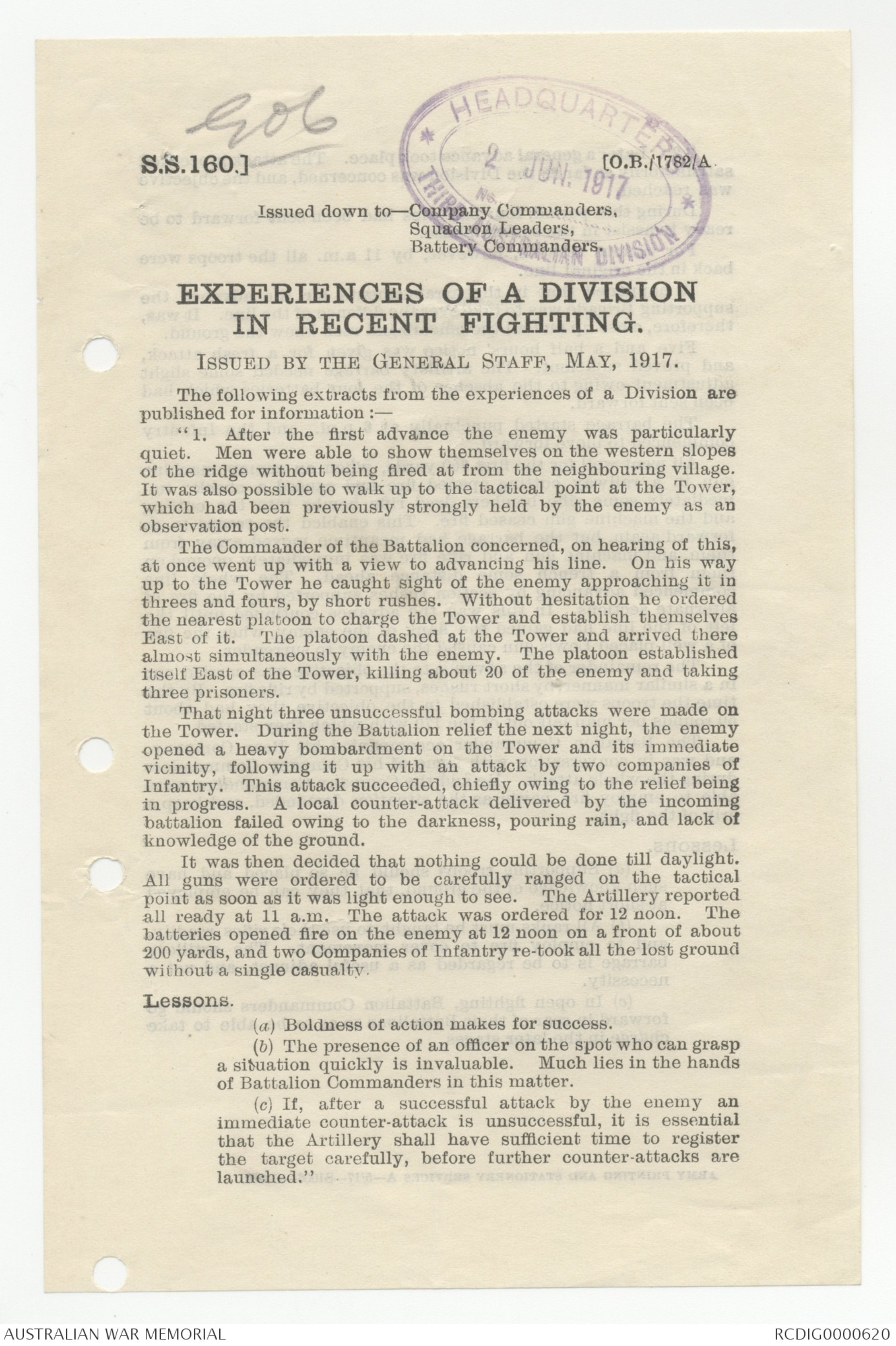
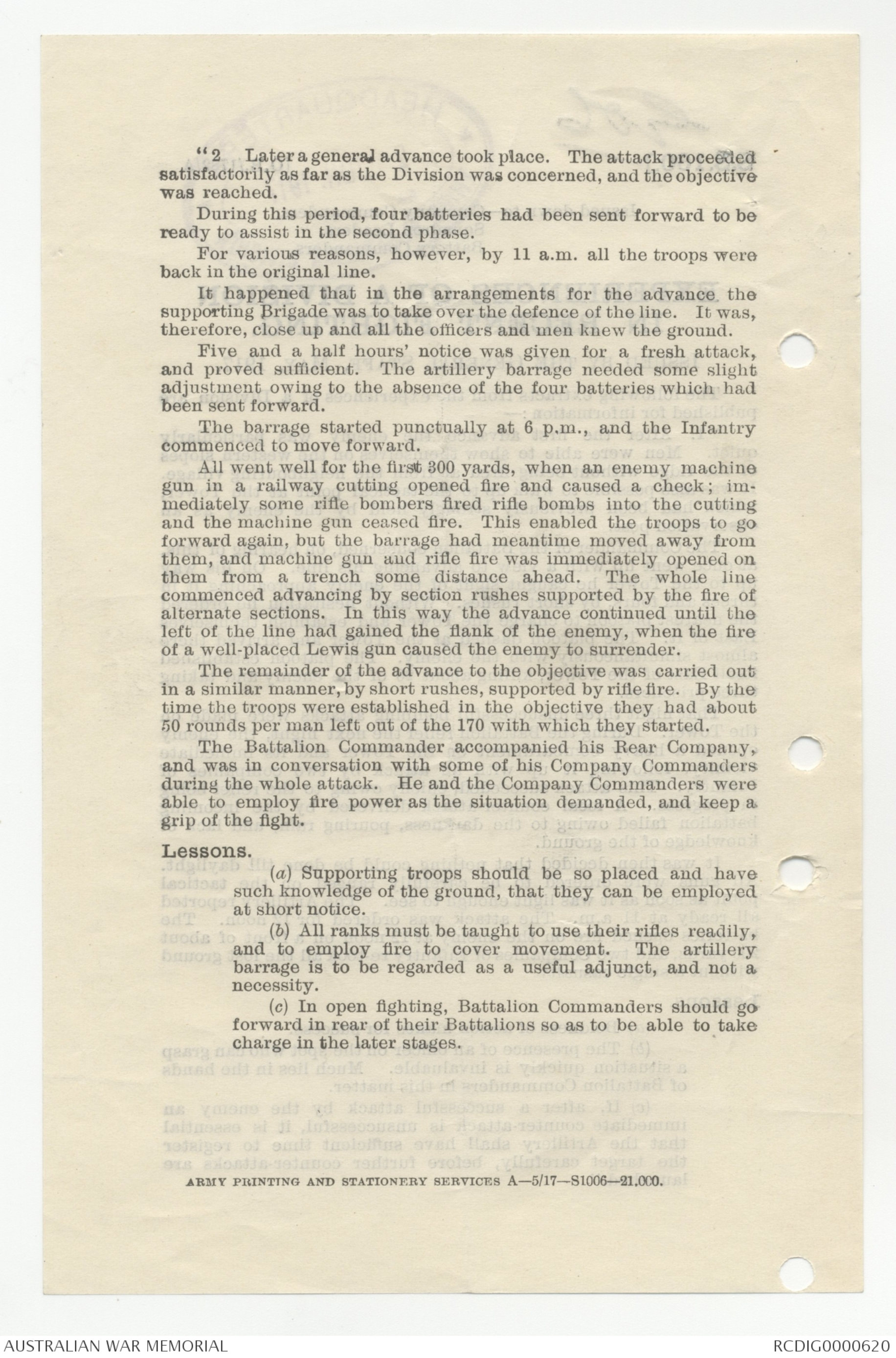
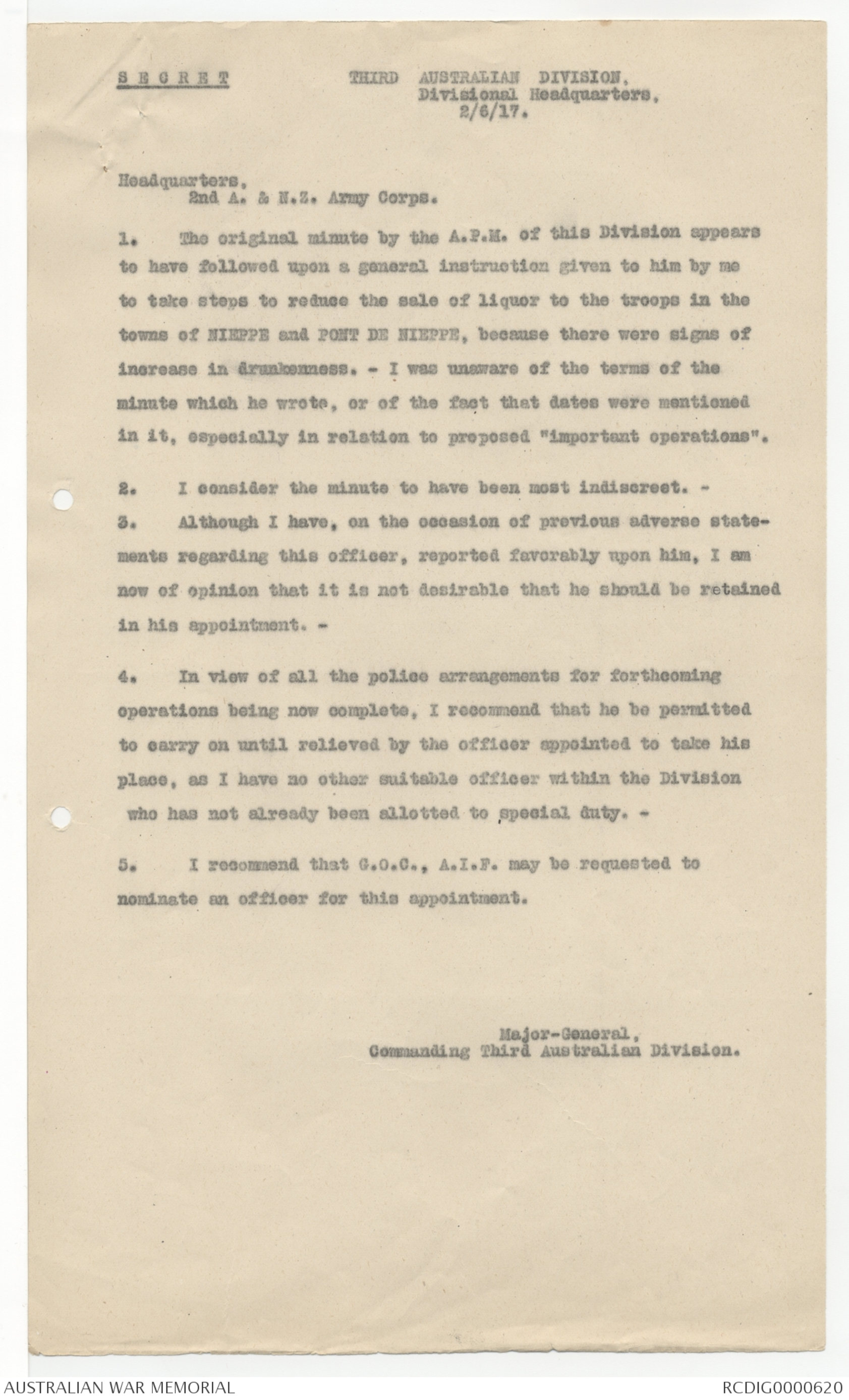
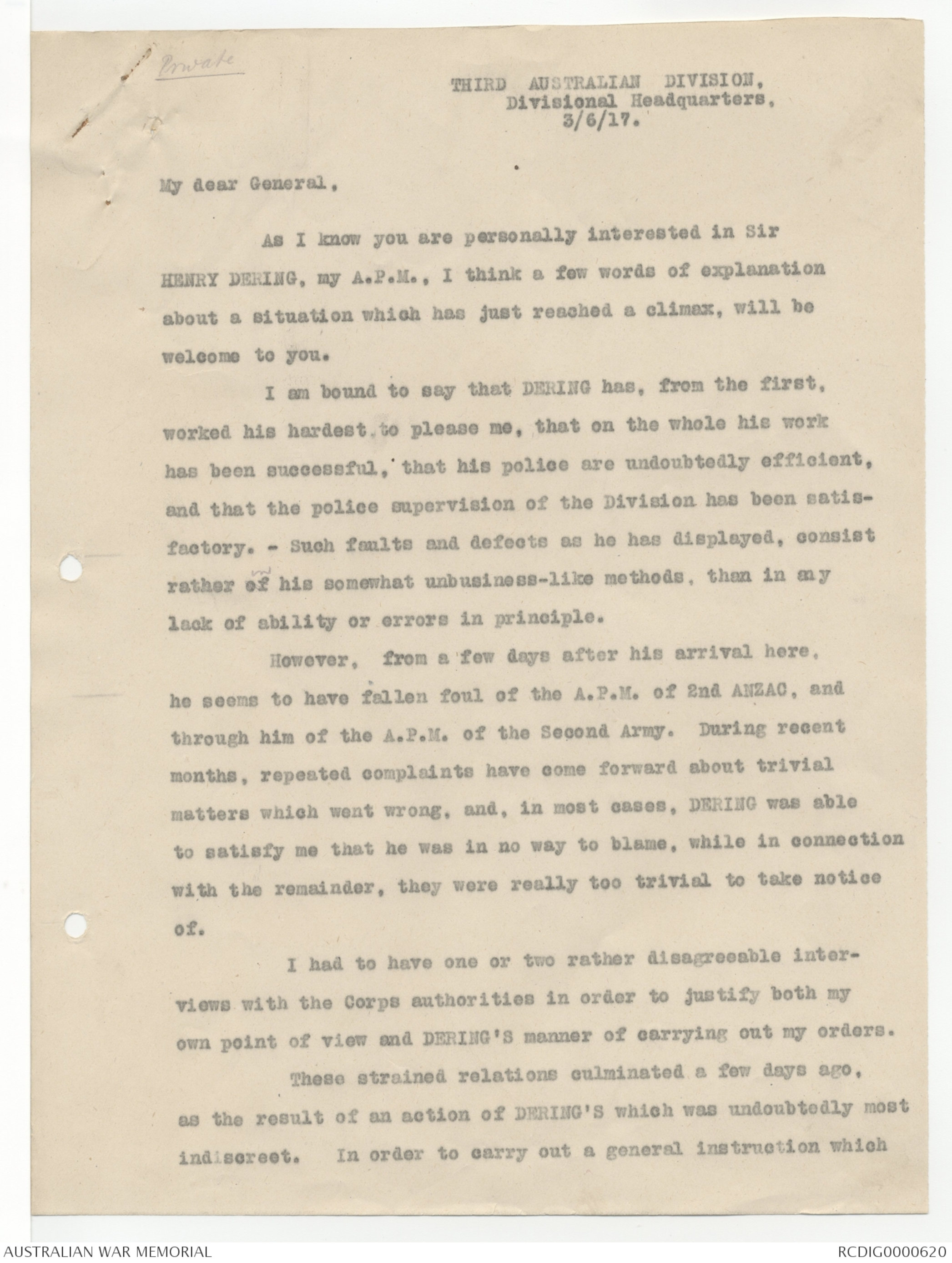
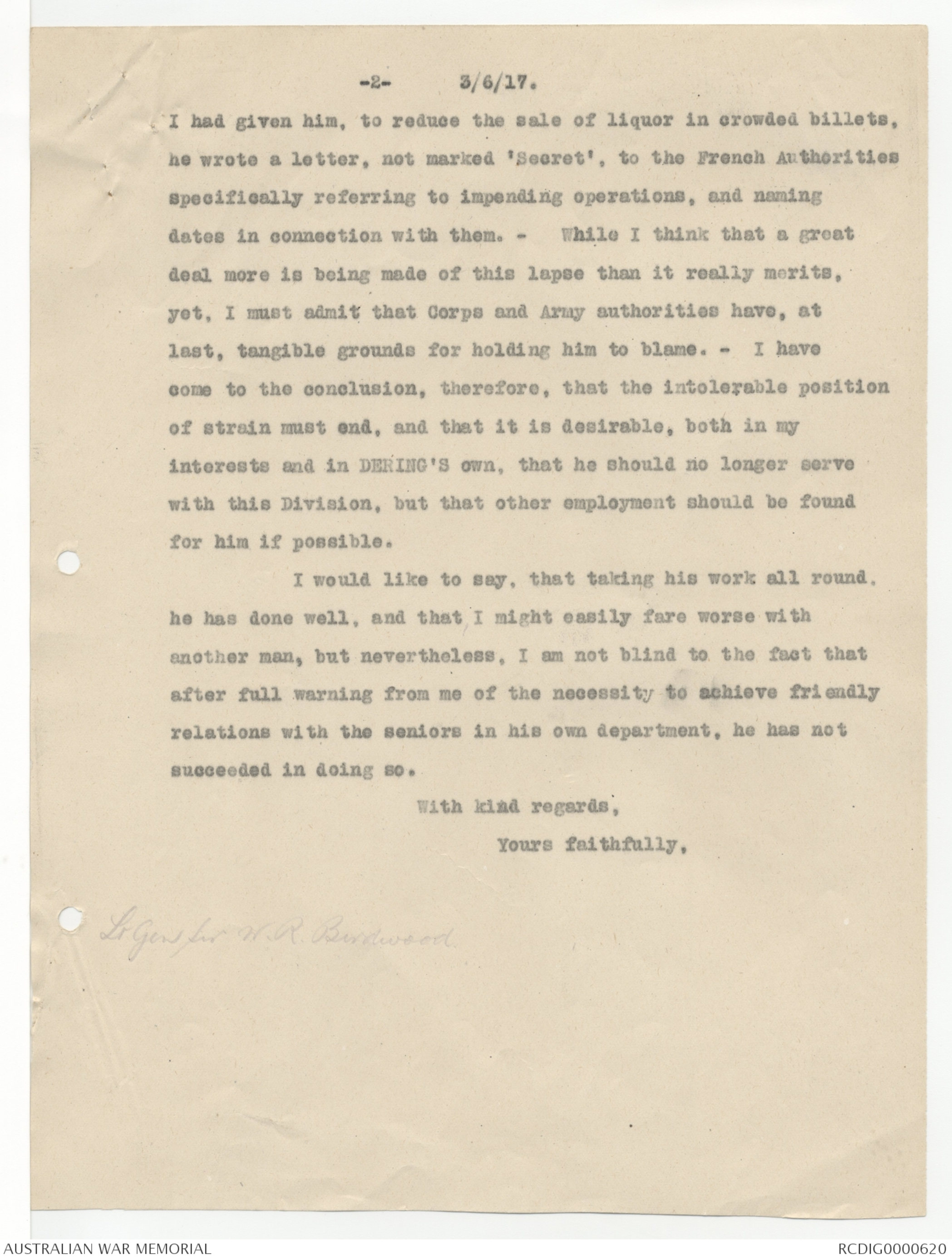
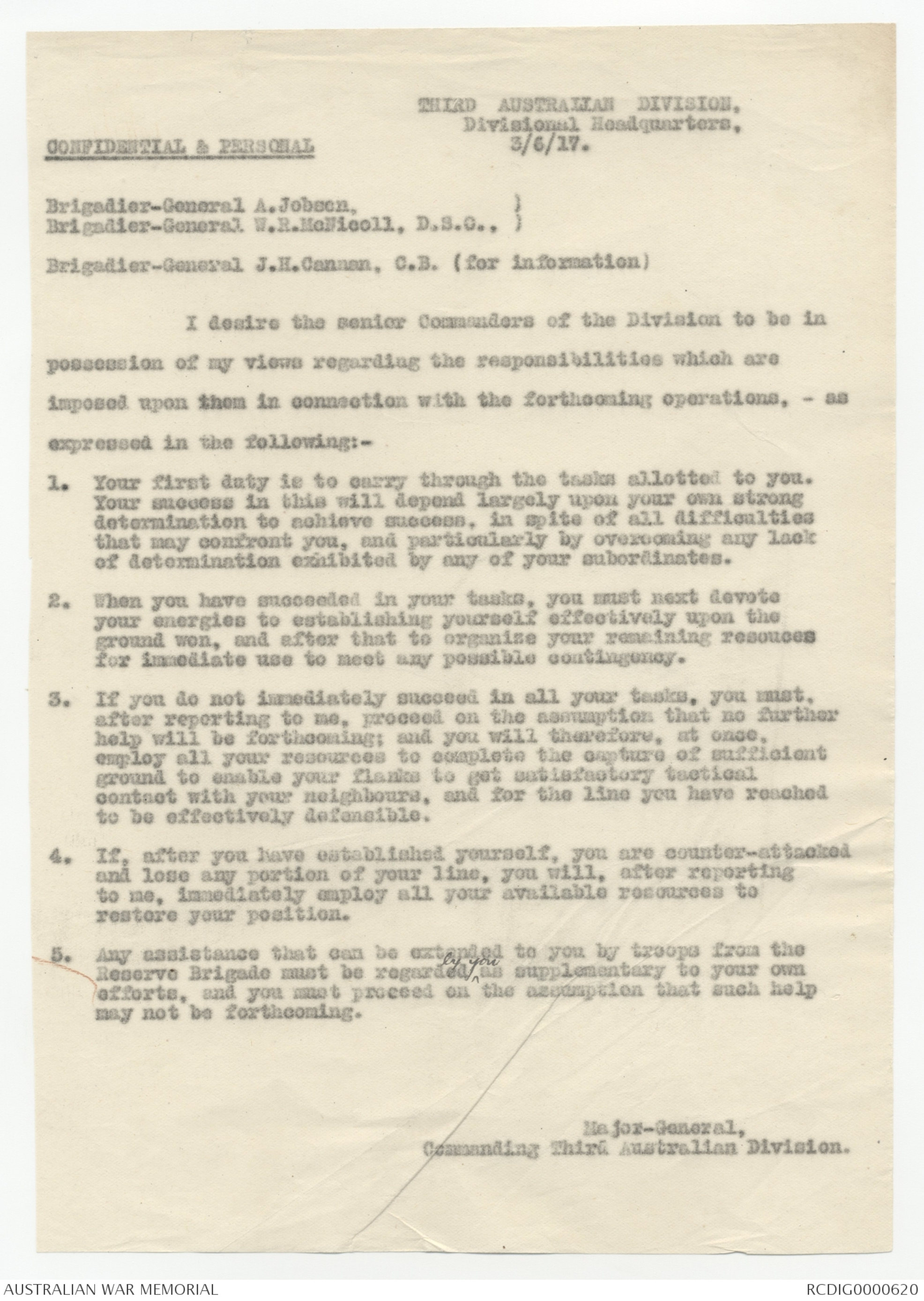
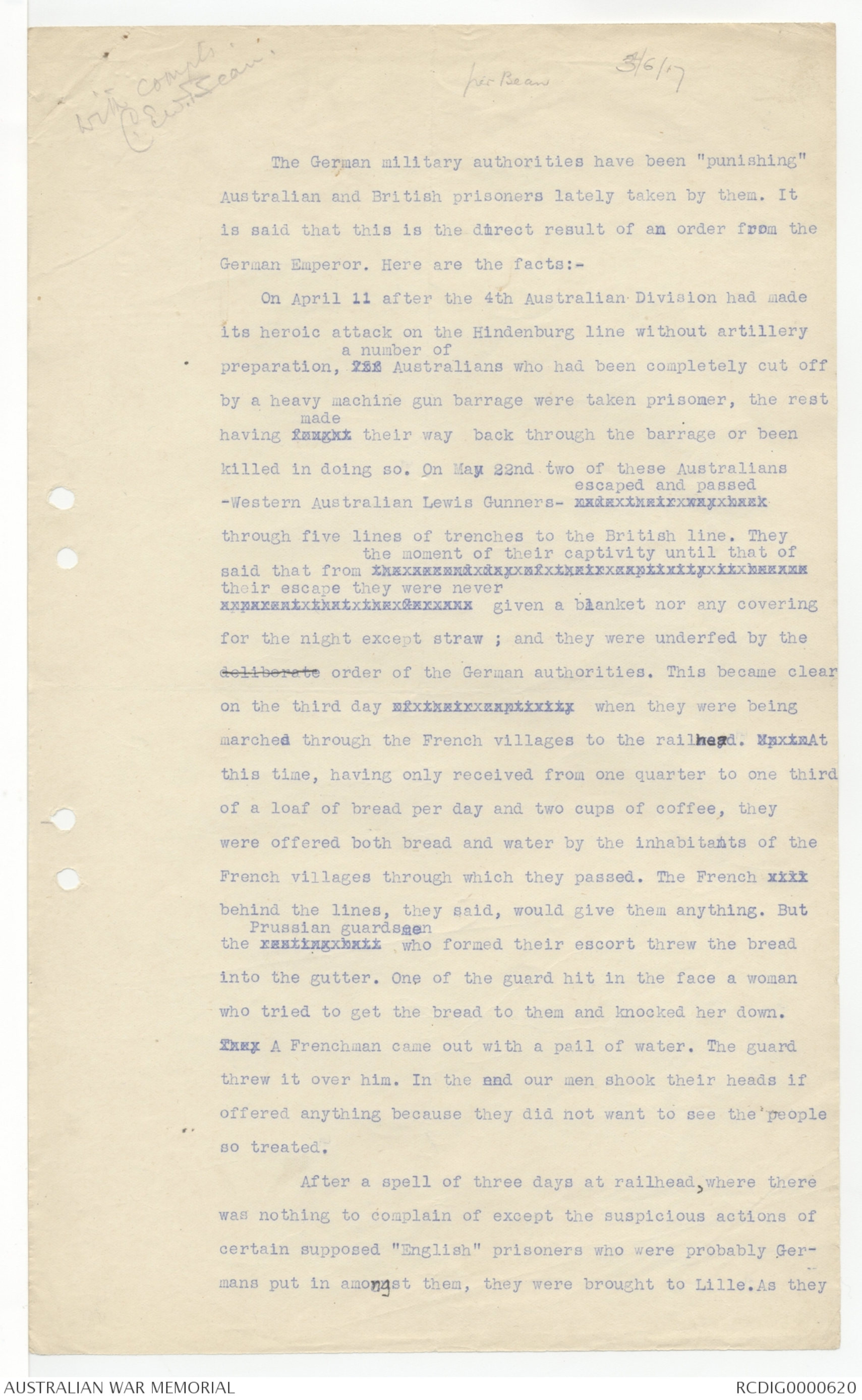
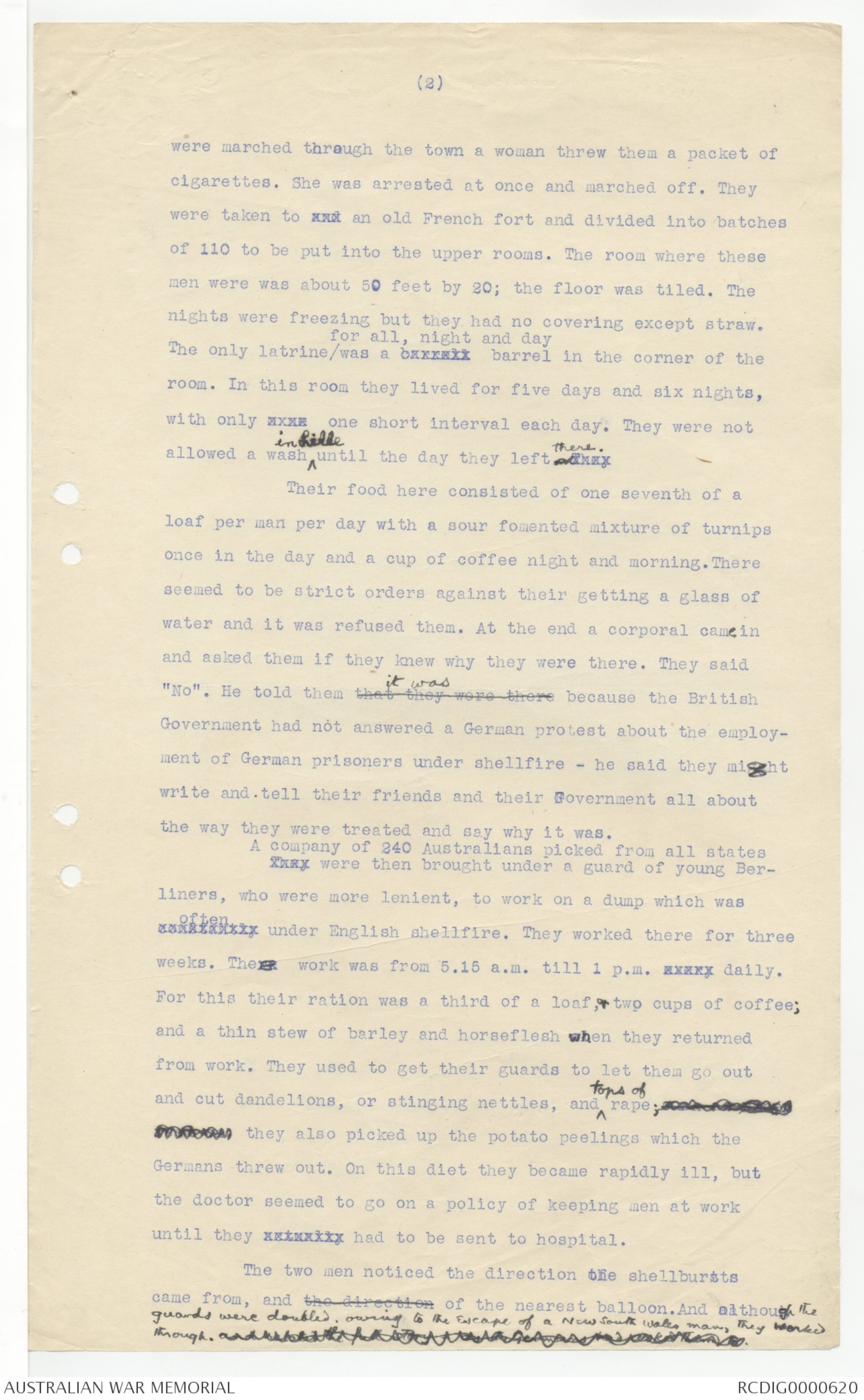
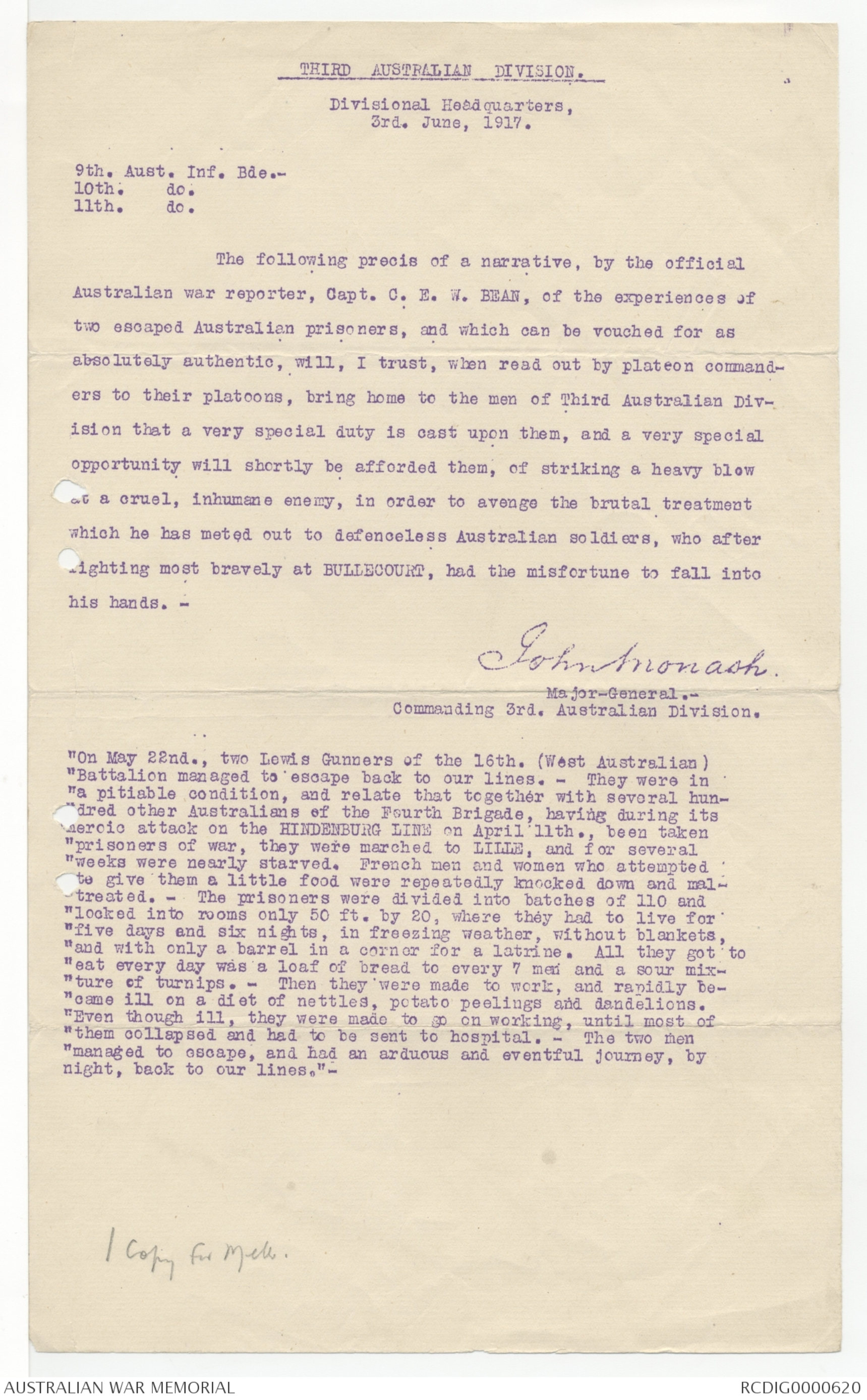
1/6/17
| UNIT. | ORDNANCE. complete with carriages, Wagons and Limbers |
Telephone Equipment. Sets |
Picks | Shovels | |
| 18.pr. | 4.5" Hw. | ||||
| 7th F.A. Brigade | 4 | 102 | 102 | ||
| 8th F.A. Brigade | 4 | 102 | 102 | ||
| 9th F.A. Brigade | 4 | 102 | 102 | ||
| 23rd F.A. Brigade | 4 | 102 | 102 | ||
C Jackson Lt
GOC
HEADQUARTERS
2 JUN 1917
THIRD AUSTRALIAN DIVISION
S.S. 160]
[O.B./1782/A.
Issued down to - Company Commanders.
Squadron Leaders,
Battery Commanders
EXPERIENCES OF A DIVISION
IN RECENT FIGHTING.
ISSUED BY THE GENERAL STAFF, MAY, 1917.
The following extracts from the experiences of a Division are
published for information:
"1. After the first advance the enemy was particularly
quiet. Men were able to show themselves on the western slopes
of the ridge without being fired at from the neighbouring village.
It was also possible to walk up to the tactical point at the Tower,
which had been previously strongly held by the enemy as an
observation post.
The Commander of the Battalion concerned, on hearing of this,
at once went up with a view to advancing his line. On his way
up to the Tower he caught sight of the enemy approaching it in
threes and fours, by short rushes. Without hesitation he ordered
the nearest platoon to charge the Tower and establish themselves
East of it. The platoon dashed at the Tower and arrived there
almost simultaneously with the enemy. The platoon established
itself East of the Tower, killing about 20 of the enemy and taking
three prisoners.
That night three unsuccessful bombing attacks were made on
the Tower. During the Battalion relief the next night, the enemy
opened a heavy bombardment on the Tower and its immediate
vicinity, following it up with an attack by two companies of
Infantry. This attack succeeded, chiefly owing to the relief being
in progress. A local counter-attack delivered by the incoming
battalion failed owing to the darkness, pouring rain, and lack of
knowledge of the ground.
It was then decided that nothing could be done till daylight.
All guns were ordered to be carefully ranged on the tactical
point as soon as it was light enough to see. The Artillery reported
all ready at 11 a.m. The attack was ordered for 12 noon. The
batteries opened fire on the enemy at 12 noon on a front of about
200 yards, and two Companies of Infantry re-took all the lost ground
without a single casualty.
Lessons.
(a) Boldness of action makes for success.
(b) The presence of an officer on the spot who can grasp
a situation quickly is invaluable. Much lies in the hands
of Battalion Commanders in this matter.
(c) If, after a successful attack by the enemy an
immediate counter-attack is unsuccessful, it is essential
that the Artillery shall have sufficient time to register
the target carefully, before further counter attacks are
launched.
"2 Later a general advance took place. The attack proceeded
satisfactorily as far as the Division was concerned, and the objective
was reached.
During this period, four batteries had been sent forward to be
ready to assist in the second phase.
For various reasons, however, by 11a.m. all the troops were
back in the original line.
It happened that in the arrangements for the advance the
supporting Brigade was to take over the defence of the line. It was,
therefore, close up and al the officers and men knew the ground.
Five and a half hours' notice was given for a fresh attack,
and proved sufficient. The artillery barrage needed some slight
adjustment owing to the absence of the four batteries which had
been sent forward.
The barrage started punctually at 6 p.m., and the Infantry
commenced to move forward.
All went well for the first 300 yards, when an enemy machine
gun in a railway cutting opened fire and caused a check;
immediately some rifle bombers fired rifle bombs into the cutting
and the machine gun ceased fire. This enabled the troops to go
forward again, but the barrage had meantime moved away from
them, and machine gun and ride fire was immediately opened on
them from a trench some distance ahead. The whole line
commenced advancing by section rushes supported by the fire of
alternate sections. In this way the advance continued until the
left of the line had gained the flank of the enemy, when the fire
of a well-placed Lewis gun caused the enemy to surrender.
The remainder of the advance to the objective was carried out
in a similar manner, by short rushes, supported by rifle fire. By the
time the troops were established in the objective they had about
50 rounds per man left out of the 170 with which they started.
The Battalion Commander accompanied his Rear Company,
and was in conversation with some of his Company Commanders
during the whole attack. He and the Company Commanders were
able to employ fire power as the situation demanded, and keep a
grip of the fight.
Lessons.
(a) Supporting troops should be so placed and have
such knowledge of the ground, that they can be employed
at short notice.
(b) All ranks must be taught to use their rifles readily,
and to employ fire to cover movement. The artillery
barrage is to be regarded as a useful adjunct, and not a
necessity.
(c) In open fighting, Battalion Commanders should go
forward in rear of their Battalions so as to be able to take
charge in the later stages.
ARMY PRINTING AND STATIONERY SERVICES A-5/17--S1006-21.000.
SECRET
THIRD AUSTRALIAN DIVISION
Divisional Headquarters.
2/6/l7.
Headquarters,
2nd A. & N.Z. Army Corps.
1. The original minute by the A.P.M. of this Division appears
to have followed upon a general instruction given to him by me
to take steps to reduce the sale of liquor to the troops in the
towns of NIEPPE and PONT DE NIEPPE, because there were signs of
increase in drunkenness. - I was unaware of the terms of the
minute which he wrote, or of the fact that dates were mentioned
in it, especially in relation to proposed "important operations"
2. I consider the minute to have been most indiscreet.-
3. Although I have, on the occasion of previous adverse statements
regarding this officer, reported favorably upon him, I am
now of opinion that it is not desirable that he should be retained
in his appointment. -
4. In view of all the police arrangements for forthcoming
operations being now complete, I recommend that he be permitted
to carry on until relieved by the officer appointed to take his
place, as I have no other suitable officer within the Division
who has not already been allotted to special duty.
5. I recommend that G.O.C.. A.I.F. may be requested to
nominate an officer for this appointment.
Major-General,
Commanding Third Australian Division.
Private
THIRD AUSTRALIAN DIVISION
Divisional Headquarters,
3/6/17.
My dear General,
As I know you are personally interested in Sir
HENRY DERING, my A.P.M., I think a few words of explanation
about a situation which has just reached a climax, will be
welcome to you.
I am bound to say that DERING has, from the first,
worked his hardest, to please me, that on the whole his work
has been successful, that his police are undoubtedly efficient,
and that the police supervision of the Division has been
satisfactory. - Such faults and defects as he has displayed, consist
rather of his somewhat unbusiness-like methods, than in any
lack of ability or errors in principle.
However, from a few days after his arrival here,
he seems to have fallen foul of the A.P.M. of 2nd ANZAC, and
through him of the A.P.M. of the Second Army. During recent
months, repeated complaints have come forward about trivial
matters which went wrong, and, in most cases, DERING was able
to satisfy me that he was in no way to blame, while in connection
with the remainder, they were really too trivial to take notice
of.
I had to have one or two rather disagreeable interviews
with the Corps authorities in order to justify both my
own point of view and DERING's manner of carrying out my orders.
These strained relations culminated a few days ago,
as the result of an action of DERING's which was undoubtedly most
indiscreet. In order to carry out a general instruction which
-2- 3/6/17.
I had given him, to reduce the sale of liquor in crowded billets,
he wrote a letter, not marked 'Secret', to the French Authorities
specifically referring to impending operations, and naming
dates in connection with them. - While I think that a great
deal more is being made of this lapse than it really merits,
yet, I must admit that Corps and Army authorities have, at
last, tangible grounds for holding him to blame. - I have
come to the conclusion, therefore, that the intolerable position
of strain must end, and that it is desirable, both in my
interests and in DERING's own, that he should no longer serve
with this Division, but that other employment should be found
for him if possible.
I would like to say, that taking his work all round,
he has done well, and that I might easily fare worse with
another man, but nevertheless, I am not blind to the fact that
after full warning from me of the necessity to achieve friendly
relations with the seniors in his own department, he has not
succeeded in doing so.
With kind regards.
Yours faithfully.
Lt Gen for W.R. Birdwood
THIRD AUSTRALIAN DIVISION,
Divisional Headquarters,
3/6/17
CONFIDENTIAL & PERSONAL
Brigadier-General A. Jobson, )
Brigadier-General W.R.McNicoll, D.S.C.,)
Brigadier-General J.H.Cannan, C.B. (for information)
I desire the senior Commanders of the Division to be in
possession of my views regarding the responsibilities which are
imposed upon them in connection with the forthcoming operations,
expressed in the following:-
1. Your first duty is to carry through the tasks allotted to you.
Your success in this will depend largely upon your own strong
determination to achieve success, in spite of all difficulties
that may confront you, and particularly by overcoming any lack
of determination exhibited by any of your subordinates.
2. When you have succeeded in your tasks, you must next devote
your energies to establishing yourself effectively upon the
ground won, and after that to organize your remaining resources
for immediate use to meet any possible contingency.
3. If you do not immediately succeed in all your tasks. you must.
after reporting to me, proceed on the assumption that no further
help will be forthcoming; and you will therefore, at once,
employ all your resources to complete the capture of sufficient
ground to enable your flanks to get satisfactory tactical
contact with your neighbours, and for the line you have reached
to be effectively defensible.
4. If. after you have established yourself, you are counter-attacked
and lose any portion of your line, you will, after reporting
to me, immediately employ all your available resources to
restore your position.
5. Any assistance that can be extended to you by troops from the
Reserve Brigade must be regarded ^by you as supplementary to your own efforts, and you must proceed on the assumption that such help
may not be forthcoming.
Major-General
Commanding Third Australian Division.
[*With Compts
C.EW.Bean
3/6/17
per Bean*]
The German military authorities have been "punishing"
Australian and British prisoners lately taken by them. It
is said that this is the direct result of an order from the
German Emperor. Here are the facts:-
On April 11 after the 4th Australian Division had made
its heroic attack on the Hindenburg line without artillery
preparation, xxx a number of Australians who had been completely cut off
by a heavy machine gun barrage were taken prisoner, the rest
having xxxx made their way back through the barrage or been
killed in doing so. On May 22nd two of these Australians
-Western Australian Lewis Gunners- xxxxxx xxxx escaped and passed
through five lines of trenches to the British line. They
said that from xxxxxxxxxxxxxxxxxxx the moment of their captivity until that ofxxxxxxxxxxxxxx their escape they were never given a blanket nor any covering
for the night except straw ; and they were underfed by thedeliberate order of the German authorities. This became clear
on the third day xxxxxxxxxxxxxx when they were being
marched through the French villages to the railhead. xxxxxx At
this time, having only received from one quarter to one third
of a loaf of bread per day and two cups of coffee, they
were offered both bread and water by the inhabitants of the
French villages through which they passed. The French xxxx
behind the lines, they said, would give them anything. But
the xxxxxxxxx Prussian guardsmen who formed their escort threw the bread
into the gutter. One of the guard hit in the face a woman
who tried to get the bread to them and knocked her down.xxxxx A Frenchman came out with a pail of water. The guard
threw it over him. In the end our men shook their heads if
offered anything because they did not want to see the people
so treated.
After a spell of three days at railhead, where there
was nothing to complain of except the suspicious actions of
certain supposed "English" prisoners who were probably Germans
put in amongst them, they were brought to Lille.As they
(2)
were marched though the town a woman threw them a packet of
cigarettes. She was arrested at once and marched off. They
were taken to xxxx an old French fort and divided into batches
of 110 to be put into the upper rooms. The room where these
men were was about 50 feet by 20; the floor was tiled. The
nights were freezing but they had no covering except straw.
The only latrine ^for all, night and day was a barrel in the corner of the
room. In this room they lived for five days and six nights,
with only xxxxx one short interval each day. They were not
allowed a wash, ^ in Lille until the day they left there. xxxxx
Their food here consisted of one seventh of a
loaf per man per day with a sour fomented mixture of turnips
once in the day and a cup of coffee night and morning. There
seemed to be strict orders against their getting a glass of
water and it was refused them. At the end a corporal came in
and asked them if they knew why they were there. They said
"No". He told them that there were there it was because the British
Government had not answered a German protest about the
employment of German prisoners under shellfire - he said they might
write and tell their friends and their Government all about
the way they were treated and say why it was.
A company of 240 Australians picked from all statesxxxx were then brought under a guard of young Berliners,
who were more lenient, to work on a dump which wasxxxxxxxx often under English shellfire. They worked there for three
weeks. The xx work was from 5.15 a.m. till 1 p.m. xxxx daily.
For this their ration was a third of a loaf , two cups of coffee;
and a thin stew of barley and horseflesh when they returned
from work. They used to get their guards to let them go out
and cut dandelions, or stinging nettles, and ^tops of rape xxxxxxxxxxxxxx they also picked up the potato peelings which the
Germans threw out. On this diet they became rapidly ill, but
the doctor seemed to go on a policy of keeping men at work
until they xxxxxxxx had to be sent to hospital.
The two men noticed the direction of the shellbursts
came from, and the direction of the nearest balloon.And although the
guards were doubled, owing to the escape of a New South Wales man, they worked
through xxxxxxxxxxxxxxxxxxxxxxxxxxxxxxxxxx
THIRD AUSTRALIAN DIVISION.
Divisional Headquarters,
3rd. June, 1917.
9th. Aust. Inf. Bde.-
10th. do.
11th. do.
The following precis of a narrative, by the official
Australian war reporter, Capt. C. E. W. BEAN, of the experiences of
two escaped Australian prisoners, and which can be vouched for as
absolutely authentic, will, I trust, when read out by platoon commanders
to their platoons, bring home to the men of Third Australian Division
that a very special duty is cast upon them, and a very special
opportunity will shortly be afforded them, of striking a heavy blow
at a cruel, inhumane enemy, in order to avenge the brutal treatment
which he has meted out to defenceless Australian soldiers, who after
fighting most bravely at BULLECOURT, had the misfortune to fall into
his hands. -
John Monash
Major-General.-
Commanding 3rd. Australian Division.
"On May 22nd., two Lewis Gunners of the 16th. (West Australian)
"Battalion managed to escape back to our lines. - They were in
"a pitiable condition, and relate that together with several hundred
"other Australians of the Fourth Brigade, having during its
"heroic attack on the HINDENBURG LINE on April 11th., been taken
"prisoners of war, they were marched to LILLE, and for several
"weeks were nearly starved. French men and women who attempted
"to give them a little food were repeatedly knocked down and
"maltreated. - The prisoners were divided into batches of 110 and
"locked into rooms only 50 ft. by 20, where they had to live for
"five days and six nights, in freezing weather, without blankets
"and with only a barrel in a corner for a latrine. All they got to
"eat every day was a loaf of bread to every 7 men and a sour
"mixture of turnips. - Then they were made to work, and rapidly
"became ill on a diet of nettles, potato peelings and dandelions.
"Even though ill, they were made to go on working, until most of
"them collapsed and had to be sent to hospital. - The two men
"managed to escape, and had an arduous and eventful journey, by
night, back to our lines."-
1 Copy for Mell.
 Maralyn K
Maralyn KThis transcription item is now locked to you for editing. To release the lock either Save your changes or Cancel.
This lock will be automatically released after 60 minutes of inactivity.